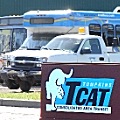- By Patty Poist
- Business & Technology
 Print
Print  TCAT is seeking community feedback in a series of public sessions to create its first‑ever Title VI Service Standards and Policy Plan – a big‑picture document that will guide TCAT in its service planning decisions in the future. TCAT will host sessions for the public to tell TCAT – and keeping in mind TCAT's budget constraints – how many hours a day and how frequently each type of transit service should run.
TCAT is seeking community feedback in a series of public sessions to create its first‑ever Title VI Service Standards and Policy Plan – a big‑picture document that will guide TCAT in its service planning decisions in the future. TCAT will host sessions for the public to tell TCAT – and keeping in mind TCAT's budget constraints – how many hours a day and how frequently each type of transit service should run.As required by the Federal Transportation Administration under Title VI of the Civil Rights Act of 1964, TCAT is required to submit the plan to ensure that it is serving the entire community fairly across all neighborhoods, races, ethnicities, languages and income levels, despite the performance of any given bus route.
"This process is about gauging the community's definition of the local quality of life as it pertains to public transit," said TCAT Service Development Manager Doug Swarts. "We will always add service where needed in response to demand, but it is important to define minimum service levels for all routes. Our resources may be limited, but the public is in the best position to tell us how we should allocate them."
To fully engage the public, TCAT Service Analyst Matt Yarrow and Swarts came up with an entertaining, interactive computer exercise to gather feedback on what times and frequency TCAT's bus service should be. Groups will be divided into four to five people, given instructions and a laptop; essentially they will become planners making the tough decisions on providing the best possible service without exceeding the budget.
Swarts and Yarrow first tried out the exercise last month on TCAT's Citizens Advisory Committee, a group of riders who meet monthly to provide feedback and suggestions for better TCAT service.
"I haven't stopped telling people about the exercise," said Kathy Halton, committee member and a former member of the Danby Town Council. "It was a dose of reality amid all of our wishful thinking about TCAT services. But I think it is absolutely important for us bus riders to really understand the limits of what TCAT can do as far as extending service and frequency of bus rides. And I learned so much doing it."
Another TCAT Citizens Advisory Committee member and TCAT bus rider agreed:
"It put me in the driver's seat in trying to balance a real budget, while always keeping the details of Title VI (The Civil Rights Act) in mind, along with the human impact of changes or eliminating routes," said Gary Cremeens, who works for Cornell University's Transportation Services.
TCATwill host sessions in the Tompkins County Public Library's Borg Warner Room (East) noon to 2 p.m., Wed., Sept. 10, and again 5:30 p.m. to 7:30 p.m. Wed., Sept. 24. Other sessions will be planned in other parts of the county for the remainder of this month and early October and will be announced at a later date.
v10i33




